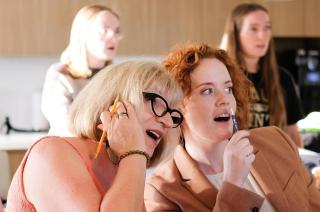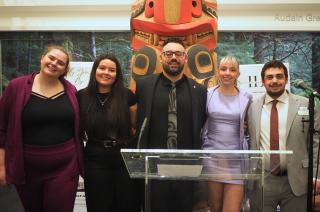Building consensus and community at the Kawaskimhon Moot
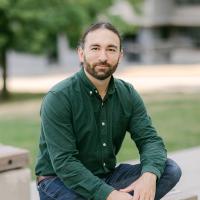
Scott Franks
Assistant Professor
Jul 10, 2025
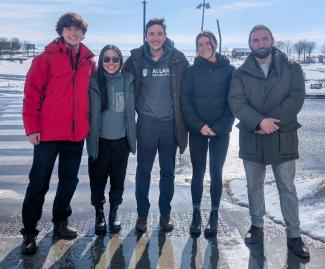
Each year, Allard Law students participate in the Kawaskimhon (the nēhiyawēwin word for “Speaking with Knowledge”) Moot. This moot is a consensus-based, non-adversarial, national, multi-party moot that simulates negotiations focused on Indigenous legal issues and peoples in Canada.
This year’s Kawaskimhon Moot took place March 7-8, 2025, at Lakehead University’s Bora Laskin Faculty of Law in Thunder Bay, Ontario, in the traditional territories of the Fort William First Nation and in the home of Anemki Wajiw.
Allard Law was represented by law students Devin Galway, Hunter Lang, Benjamin Foucault, and Quinn Mayo. Our students were coached by Mandell Pinder LLP counsel Stephen Mussell and Aaron Wilson and myself. Over the course of two months, our mooters developed their written and oral advocacy skills and learned about Métis peoples and their legal orders, Canadian law and Indigenous legal principles.
The moot problem
This year’s moot emphasized Indigenous peoples’ laws and jurisdiction in relation to water, reflecting current issues and approaches to the practice of Indigenous and Aboriginal law in Canada.
The moot problem was inspired by Bills C-92 and C-61 and Indigenous peoples’ exercise of their governance and legal orders and traditions in this current context. In 2019, Parliament enacted An Act Respecting First Nations, Métis, and Inuit Children Youth and Families (“C-92”). In a recent decision, the Supreme Court of Canada upheld Parliament’s recognition of Indigenous peoples’ inherent right to self-government and the referential incorporation of Indigenous peoples’ laws as federal law. This was a notable development in Canada’s approach to “legislative reconciliation.” Then, in 2023, Parliament repeated this approach with Bill C-61, the First Nations Clean Water Act. The proposed Act would have recognized First Nations’ inherent right to govern their lands.
Considering these developments, this moot engaged issues such as:
- Indigenous peoples’ legal orders and traditions in relation to water and governance;
- The relationship between Indigenous peoples’ legal orders and rights and federal and provincial law; and
- The ethical obligations of lawyers who are trained in Canadian law and licensed to practice law, and the ethical obligations related to engagement with Indigenous peoples’ legal orders and traditions.
In a significant change from previous years, all of the teams at each negotiating table represented an Indigenous nation, representative organization or administrative agency. Government was not formally represented at any of the tables. As our team member Quinn put it, this gave students a “unique opportunity to discuss Indigenous water governance according to our respective clients’ laws and inherent jurisdiction… I learned more about myself and my role as a future lawyer looking to contribute to this work.”
At the moot
Throughout the Kawaskimhon Moot, students learned about Anishinaabeg nibi-innakonigewin (Anishinaabeg water law), as well as Anishinaabeg legal principles and ceremony.
The first day opened with the Lighting of the Sacred Fire in the Outdoor Learning Space. Elders, community members, support staff, students and coaches gathered around the Sacred Fire to start the moot with purpose. From the top floor of the law school, we could see Nanabijou or the Sleeping Giant mesa on Lake Superior. Elders opened the Welcome with songs and teachings related to Anishinaabeg nibi-innakonigewin.
In negotiations, each team took a strikingly different approach.
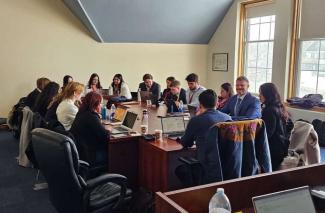
Quinn and Hunter represented the Alberta Metis Settlements Delegation at a table for the Mackenzie River Basin. The Mackenzie River Basin is also called the Dehcho (“Big River” in Slavey and Tłı̨chǫ (Dogrib)), Kuukpaak (“Great River” in Inuvialuktun), Nagwichoonjik (“River Through a Big Country” in Gwich’in), and Grande Rivière (“Great River” in Michif). This negotiation focused on Indigenous governance over one of North America's largest river systems, spanning the Northwest Territories, Yukon, British Columbia, Alberta, and Saskatchewan.
The Mackenzie River Basin table focused on the development of an Agreement-in-Principle for collaborative governance and dispute resolution in the basin area. Hunter Lang and Quinn Mayo focused on these procedures, drawing from and explaining to the table the unique experiences of the Metis Settlements in Alberta. The table concluded an Agreement-in-Principle.
Devin and Benjamin represented the Métis Nation of Saskatchewan at a table for the Lake Winnipeg Watershed, also called Niibinaabe-zaaga'igan Wiinibiigaa-nibiwaan (Anishinaabemowin), Winipēk Sākahikan Nīkānīwāw (nēhiyawēwin), or Lii Watèr (michif).
The Winnipeg Watershed table focused on the development of a treaty based on Indigenous legal principles and protocols. The Winnipeg table also incorporated Anishinaabeg and Nehiyawak teaching related to water, and closed their treaty with a pipe ceremony conducted by Marc Kruse, Director of Indigenous Legal Learning and Services at Robson Hall, University of Manitoba. The table concluded a Treaty between the First Nations and Métis delegates.
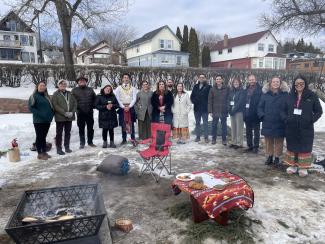
Ben, Hunter, Quinn and Devin did an excellent job, and I was so happy to see Allard Law represented with professionalism and kindness.
As the moot drew to a close, participants gathered once more for the Covering of the Sacred Fire, a symbolic conclusion to their time together. The event ended with a keynote on Anishinaabe nibi-inaakonigewin by Aimée Craft and a closing banquet, where participants reflected on their experiences, strengthened connections and honored the efforts of all involved. The moot ended with a travelling song before the parties departed the next day to their home fires. On the final day, our teams attended the Indigenous Cultural Traditions Pow Wow at Lakehead University. It was wonderful to celebrate the end of the moot with an opportunity to watch the dancers’ grand entry.
Thank you
I want to extend thanks to Larissa Speak and Robin Sutherland, Director of Indigenous Relations, at the Bora Laskin School of Law, and to the elders, community members, students and staff for their organization and leadership for this year’s moot. I also want to acknowledge the exceptional work of all of the teams and their coaches.
A sincere thank you to our sponsor, Mandell Pinder LLP, for your generous financial support and invaluable advocacy training. Without your support, this incredibly impactful mooting experience would not have been possible. We appreciate your commitment to enhancing students’ educational experiences at the Allard School of Law at UBC.
- Allard School of Law
- Indigenous Legal Studies

